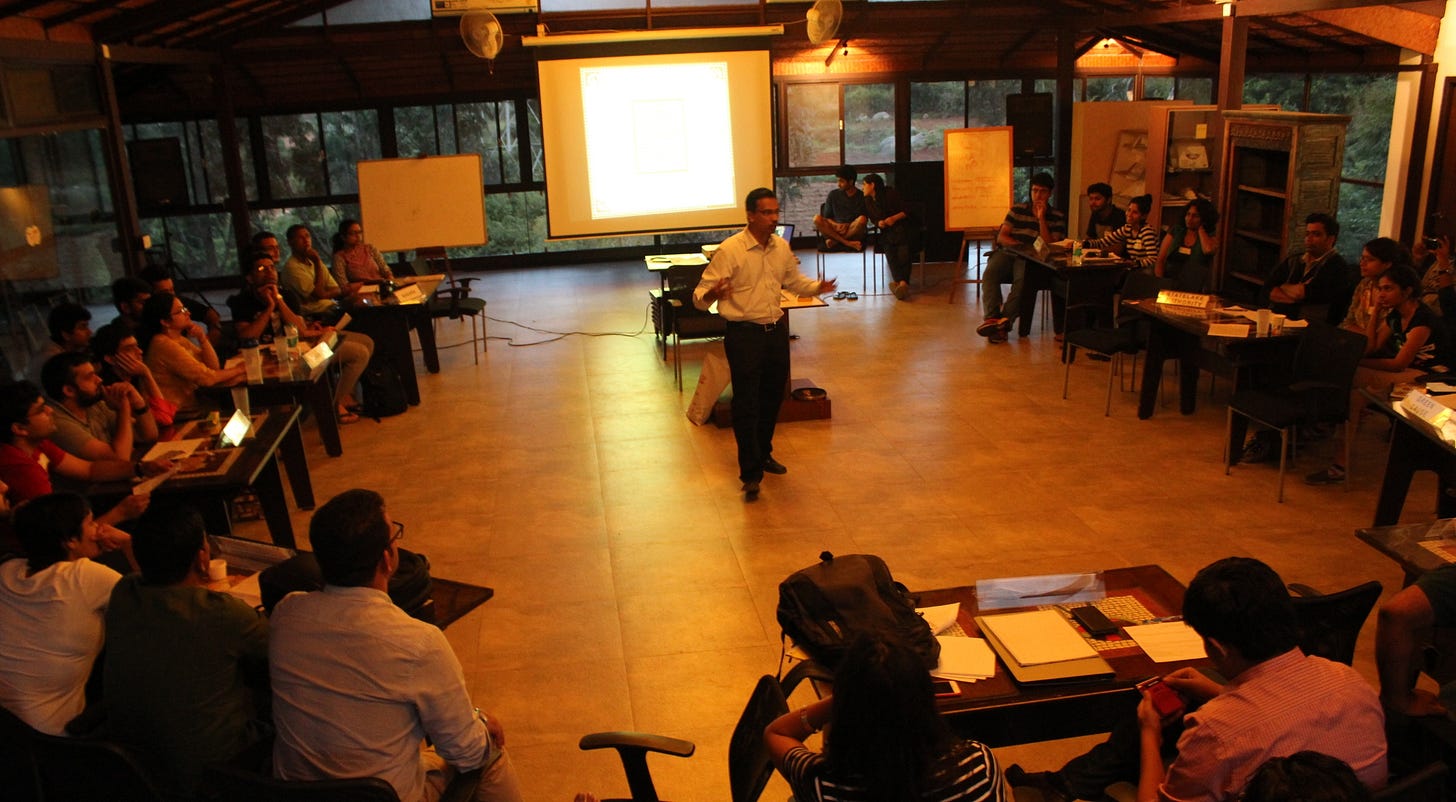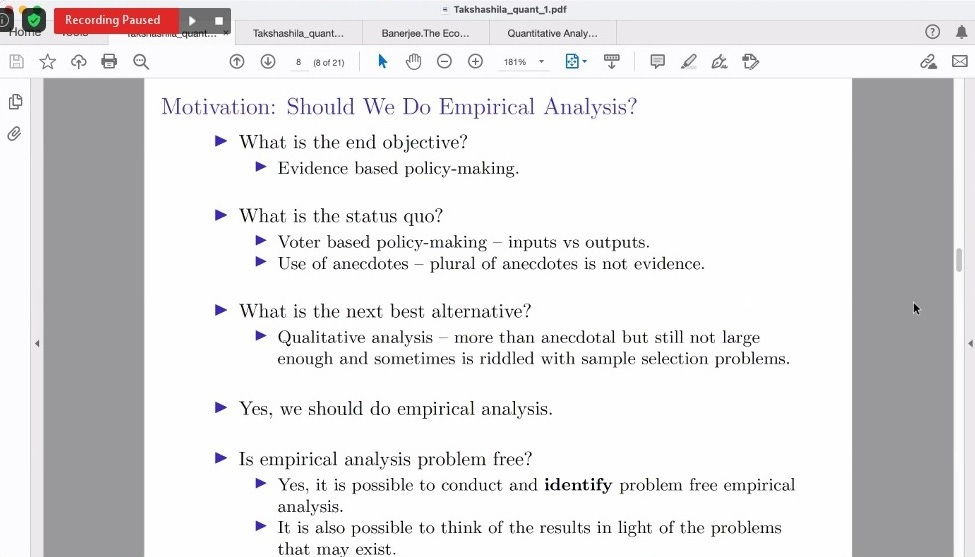Takshashila Sandesh - June 2021
A newsletter connecting Takshashila alumni to ideas, opportunities, and networks
This newsletter is curated by Sowmya Nandan and Apurva Kumar
We are back with another dispatch of Sandesh where we share work opportunities in policy, events and other perspectives from the Takshashila Institution.
Work/Internship Opportunities
Heifer International is hiring a Senior Communications Officer
IT For Change is hiring Policy Researchers
Avanti Fellows is looking for a Academic Managers for its System Transformation and Innovation team
Central Square Foundation is looking to hire for 2 open positions for its Gujarat FLN (Foundational Literacy and Numeracy) Project team- Interested candidates can send their CVs to careers@foundationallearning.org
Centre for Reimagining Innovation and Science Policy [CRISP] at CCS is hiring-Interested candidates can send their CVs to varun.aggarwal@gmail.com
Piramal Swasthya is hiring a Research Associate (Public Health Technology)- Interested candidates can send their CVs to hr.health@piramalswasthya.org
Featured Alumni Story | Sandeep Menon
Sandeep wears a corporate hat and sits on the boards of many for-profit and not-for-profit ventures. But his alter ego tramps through jungles every month and is closely plugged into wildlife/conservation issues. He is also secretary and board member at the Wildlife Association of South India, where he does a fair bit of work around river ecosystems and Mahseer conservation in particular.
Sandeep says that it is natural for some people to wonder if ‘public policy’ is really relevant to ones future? But the fact is that a firm grounding in economics, governance and policy making is invaluable for leaders across domains. And when it comes with high quality faculty that challenges you at every step, hones your critical thinking and improves your ability to craft sustainable solutions, it becomes invaluable. Education at Takshashila is a completely worthwhile investment, which results in a long term association with deep thinking.
You can connect with Sandeep Menon on LinkedIn
Students’ Insights
Politics of the Internet: ‘The Internet has the power to bring about radical changes in any political system. It’s importance in shaping the politics of every country, opinions of all it’s citizens and world politics cannot be easily overlooked or underestimated. The internet has changed the way people communicate and consume information thereby enabling people to engage in political activism and citizen journalism.’ - Krithiga Narayanan (PGP 5)
Book Review- Community Radio Policies in South Asia: ‘In Community Radio Policies in South Asia: A Deliberative Policy Ecology Approach, Preeti Raghunath uses the emerging concept of policy ethnography to study community radio policymaking in four South Asian countries: India, Sri Lanka, Bangladesh and Nepal. She adopts and introduces a bottom-up approach called the ‘deliberative policy ecology approach’. Moving away from the state as a single policy actor, she explores other policy actors and factors that shape community radio policies in these countries.’ - Kamesh Shekar (PGP 5)
Don’t ignore our young healthcare workers: ‘As we re-evaluate the state of healthcare in our country, it is time we bring an end to our apathy towards healthcare workers. Amendments to the Epidemic Disease Act to protect frontline workers from violence and centrally-sponsored insurance schemes are welcome. Citizens must now speak out against the exploitation of our young trainees. It is our moral responsibility to end this toxic culture that feeds off public apathy.’- Vinayak Jain (GCPP-Health & Life Sciences 2)
The Family Man 2’s slick portrayal of a tech dystopia: ‘Digital literacy in India remains concerningly low, and the idea of data privacy is far from ingrained for most people. Glorification of surveillance technologies through TV shows and movies tilts the scales in the favor of the state – when there is little awareness about the dangers of these technologies, there is little chance that their deployment will be subjected to scrutiny.’-Priyam Nayak (GCPP-Tech & Policy)
If you are also working on an interesting public policy issue and want to share with others, then do write to us at outreach@takshashila.org.in
Takshashila Gyan
China has recently relaxed its two-child policy to three. In this dispatch of the AtU, Pranay writes, ‘China’s one-child policy had accelerated the decline in fertility rates. Changing the upper limit to two in 2016 and to three in 2021 is the closest that an authoritarian regime can come to accepting failure’.
Worried about fake news? We’ve got you covered. Prateek, in his recent dispatch has covered some latest stories and news on fake news.
The pandemic and the lockdowns have severely affected the gig workers across the country. In his recent dispatch, Rohan discusses a report on app-based transport and delivery workers.
Podcasts
Vaccines and Intellectual Property: As the world continues its vaccination drive, countries like India and South Africa have been calling for an intellectual property waiver to make vaccine manufacturing easier. This has led to a heated discussion on intellectual property rights. Rohan Seth talks about the issues involved here to Megha Guruprasad, an IPR lawyer and currently a student in the GCPP (Tech and Policy) program at Takshashila.
The Challenges of Governing States: India's states have often followed very different trajectories. In this episode, Suman Joshi and Sarthak Pradhan discuss the performance of some states, their capacity for governance, and the challenges they face.This episode is based on the book "Despite the State: Why India Lets Its People Down and how They Cope" by M. Rajshekhar.
The Evolution of Indian Science: In the years after independence, a handful of extraordinary visionaries laid the foundations for Indian science in fields ranging from space exploration to chemistry and biology. Journalist Hari Pulakkat talks to Aditya Ramanathan and Aditya Pareek about his new book, Space. Life. Matter., which chronicles the work of India's space pioneers.
What has Takshashila been up to?
We are halfway through the 48-week long Post-Graduate Programme in Public Policy. In the past few weeks we had some very interesting webinars by senior policy practitioners and scholars. M R Madhavan spoke on how the Parliament works and how laws are made; Shakti Sinha spoke about how Indian bureaucracy plans and implements policies and also about the ethical dilemmas of a civil servant; Surya Prakash helped unpack the judicial architecture of India and the judicial reforms that can change India’s judicial system and finally Naveen Kumar took lectures on Quantitative Analysis in Public Policy where he demystified RCTs.
The Policy School website is going to have a new look and feel with more interesting features. We will keep you posted once we launch it.






